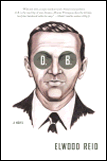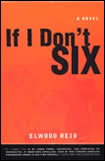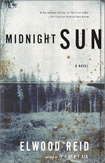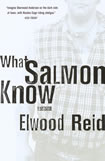Elwood Reid
posted Oct 4, 2004
Hidden within the copyright legalese of Elwood Reid's new novel, D.B., is an authorly interjection:
"Yes, a man calling himself Dan Cooper jumped out of a plane with $200,000 after holding the crew hostage. That much is true. The rest is purely fictional, including depictions of the flight crew and FBI agents who worked on the Cooper case. As for Cooper's imagined escape and subsequent odyssey, that too is fictional, but open to correction should Cooper want to contact the author."
Maybe Cooper won't come calling. But maybe—just maybe—he's an obsessive Web surfer who'll happen across this site, read this interview, and find it sufficiently interesting to email us, asking how he can find one Elwood Reid, hotshot novelist and master conjurer of daring crimes and desperate post-getaway wanderings…
| * * |
D.B. begins and ends like a crime novel. But in the middle, it's more a book of ideas—specifically, an examination of the place and significance of work in men's lives. Did you intend to combine these two genres in one book, or did this happen by chance, as you were writing it?
I try to avoid tagging prose with backhanded genre assignments. It raises certain expectations that will be dashed. I take this is a question of opening strategy. In that sense my only goal as a writer is to suck readers in and make them turn pages. I'm not a fan of books that feature characters staring out windows and having page-long epiphanies that float in and out of flashback. I just find it phony and precious and perhaps that's a lack of sophistication on my part. The novels I love tackle you with killer sentences and/or great situations:
[James M. Cain's] The Postman Always Rings Twice starts, "They threw me off the hay truck about noon."
[Saul] Bellow's Henderson the Rain King: "What made me take this trip to Africa?"
Charles Portis's Dog of the South: "My wife Norma had run off with Guy Dupree and I was waiting around for the credit card billings to come in so I could see where they'd gone."
Paul Auster's City of Glass: "It was a wrong number that started it, the telephone ringing three times in the dead of night, and the voice on the other end asking for someone he was not." The rest of that opening paragraph functions as a mission statement of great novels. "In the beginning, there was simply the event and its consequences. Whether it might have turned out differently, or whether it was all predetermined with the first word that came from the stranger's mouth, is not the question. The question is the story itself, and whether or not it means something is not for the story to tell."
I could go on forever—but all novels are little mysteries or adventures. What happens next? How or why did this happen?
In the case of D.B.: A guy jumped out of plane with $200,000 and disappeared forever. Yeah, he committed a crime, and I suppose I cranked up the verbs and clipped some dialogue to make it hum. What drew me to the story was the aftermath—or what I imagined the aftermath to be of this one act. So I had to deal with the act itself. Grab the reader by the throat and jerk them into the book so I could tell this story about work and responsibility and the fantasy of escaping the whirr of the grindstone.
You once said, "I don't do research for novels." Putting aside the real-life inspiration for D.B., there are a lot of 70s and 80s pop culture references scattered throughout the book. Were you working from memory here, or did you do a little Americana research? For example, did the classic D.B. Cooper episode of In Search Of… come in handy? And if so, were you relying on your childhood memory of that episode, or did you track down a copy via eBay, or get it from Leonard Nimoy himself?
I did very little research other than verifying memories and making sure the dates jibed with what I'd written. I'm not a fan of heavily researched novels because I think too much detail deadens the prose and crowds out the characters. A good analogy would be the advent of CGI in the movies—it looks great and allows the filmmakers to do things they could never do and establish a certain geek authority. But I'll take the magic of King Kong any fucking day of the week.
That said, the book certainly was influenced by the vibe of In Search Of…
There was a movie based on Cooper's escape made a while back. Ever see it?
Caught five minutes of it on cable once. Kathryn Harrold who plays DB Cooper's girl is a sight to behold.
The plot of D.B. could be described as a "promise"—the promise being that the paths of these two main characters will eventually cross. Did you grapple with the decision of where and when their paths would cross? Did you consider not having them meet at all?
Great question. That "promise" caused me a lot of problems. Once I decided to split the narrative and follow both Frank Marshall and D.B., I knew I was creating unreal expectations. I knew I didn't want a big ending and also knew I couldn't cheat an ending. To make the ending work I had to chart the inner journeys of both characters so that when the narratives intersect the resolution is an internally satisfying one. The narratives kiss like two pool balls.
Speaking of paths taken, many writers begin their careers by fictionalizing their own lives. In your case, your time in Alaska clearly informs the story "What Salmon Know" and the novel Midnight Sun. And much has been made of how, in your debut novel If I Don't Six, you drew on what you saw and did as a college football player. By contrast, D.B. doesn't seem to rely so much on personal experience. Do you see this departure as part of your evolution as a writer?
All of it is fiction. Unfortunately my lack of ability forces me to invest emotionally in characters. To do that I draw on real people and situations, dress 'em up a bit, stir and voilá—fiction! I'm not one of those writers who hold characters up for easy satire or ridicule and would make the argument that writers who truck in that trade are only writing about themselves. I like all of my characters and must have an emotional link to them.
A certain fatalism pervades your fiction, particularly D.B.. Even when things are looking up for your characters, one senses that a downturn is just around the corner. In an earlier interview, you said, "I'm from Ohio, I expect the worst to happen." Do you see your work as reflecting a certain Ohio view of the world? A specifically Cleveland perspective?
You got me. I expect the worst and am rarely disappointed. The silver lining of subscribing to such a dark view is the salvation of a work ethic?roll boulder up hill, press nose to wheel, etc. Sweat and toil can stave off total collapse. I really believe that. If I did not I couldn't get up in the morning.
A good deal of D.B. takes place outdoors, in the Pacific Northwest and Mexico, places that most people consider majestic and picturesque. Yet you describe them in an aggressively matter-of-fact way, and often paint them as disgusting, tedious, and ugly. Is this a reaction against traditional nature writing, which tends to focus on the extraordinary and the beautiful?
Who the fuck wants to read a Thomas Kincaid painting? My eyes glaze over after a few sentences describing perfect sunsets and God-stroked landscapes. Scuff it up, scar it, boil it down to the essentials and you've got something interesting.
Most of your works have a high testosterone level (dominant male protagonists, occasional violence, etc…). Do you think eventually you'll take a crack at the feminine side of things? Or is this a case of "Fuck it, I am who I am…and I write what I write"?
I'm glad you asked this.
Even answering this question is a problem. You would never flip this question and ask the inverse to a woman writer. And to even entertain the idea that one should make certain concessions to capture an audience is a very dangerous notion. I wouldn't pretend to know what the feminine side of things would be when it comes to writing, unless you are assigning gender traits to writing (another dangerous and ultimately petty exercise). I mean, would Flannery O'Conner be considered feminine? Katharine Dunn? Lynda Barry? No—they, like all good writers, create true characters and don't worry what side of the fence they fall on. I won't defend my work except to quote Popeye: "I am what I am."
You said you wanted to write about D.B. Cooper because the story of his crime is an arresting opening scene for a book—as, indeed, it is in D.B.. When you're not writing about your own experience, where do you get the ideas for your stories and books? How do you choose which to use, which to leave for later, and which to discard?
Novels are ideas or characters that won't go away. If it hangs around in that novel tumbler long enough, I know there is enough juice to wring and so I start.
You know those vending machines that have Kit Kats and Doritos on silver coils behind glass? Well a novel is like this stubborn piece of candy. You stare at it a long time until you decide you want it, imagining how good it's going to taste. Then you drop your money in the slot and punch up the right code, thinking it's going to drop into that paneled slot. But it gets hung up and refuses to drop. So you shake and shoulder the machine until it drops. But after you've inhaled that piece of candy you feel empty and cheap. That's novel writing.
© 2004 failbetter LLC · all rights reserved











